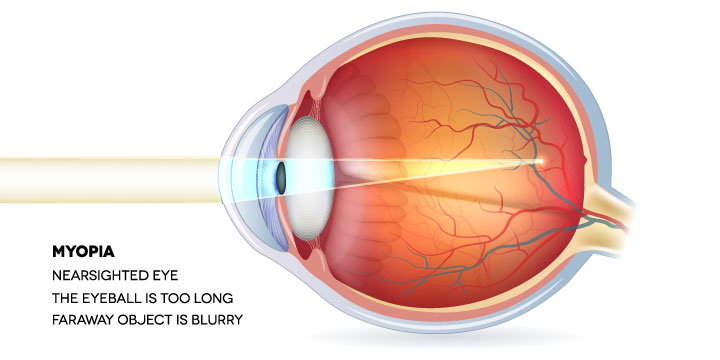Myopia - Symptoms, Causes and Treatment
03-05-2024
What is Myopia (Nearsightedness)?
Myopia, also known as nearsightedness, is a common refractive error that affects the eye's ability to focus on distant objects clearly. It occurs when the eyeball is too long or the cornea is too curved, causing light rays to focus in front of the retina instead of directly on it. This results in blurry vision when looking at objects in the distance, while close-up vision remains clear. Myopia can often be corrected with prescription glasses or contact lenses to help the eye focus properly and improve visual acuity.What Are The Causes Of Myopia?
Myopia, or nearsightedness, is primarily caused by a combination of genetic and environmental factors. Individuals with parents who are nearsighted are more likely to develop myopia themselves, suggesting a hereditary component to the condition. Additionally, spending a significant amount of time engaging in close-up activities, such as reading or looking at screens, can contribute to the development of myopia. When the eyeball grows too long or the cornea is too curved, light entering the eye focuses in front of the retina instead of directly on it, leading to blurry vision when looking at objects in the distance.What Are The Risk Factors For Myopia?
Several risk factors have been identified for the development of myopia. These include genetics, with individuals having a family history of myopia being more likely to develop the condition themselves. Environmental factors such as spending a significant amount of time engaging in near work activities, such as reading or using electronic devices, have also been associated with an increased risk of developing myopia. Additionally, certain lifestyle factors like lack of outdoor time and limited exposure to natural light have been linked to an elevated risk of myopia. Finally, certain ethnicities, particularly those of East Asian descent, have been found to have a higher prevalence of myopia compared to other populations.What Are Symptoms Of Myopia?
Myopia, also known as nearsightedness, is characterized by difficulty seeing distant objects clearly. People with myopia may experience symptoms such as blurred vision when looking at objects far away, squinting to see more clearly, eye strain or fatigue, headaches, and difficulty seeing at night or in low light conditions. In some cases, individuals with myopia may also have trouble seeing clearly while driving or participating in sports that require good distance vision. If you are experiencing any of these symptoms, it is important to schedule an eye exam with your optometrist to determine if you have myopia and discuss potential treatment options.How is Myopia Diagnosed?
Myopia is diagnosed through a comprehensive eye examination performed by an optometrist. During this examination, various tests are conducted to measure the sharpness of both near and distance vision, as well as the ability of the eyes to focus properly. One of the most common tests used to diagnose myopia is the visual acuity test, where the patient reads letters from a chart at a distance. Additionally, the optometrist may use a retinoscope or autorefractor to measure how light is refracted by the eye, helping to determine the degree of myopia present. By combining the results of these tests, along with the patient's medical history and any reported symptoms, the optometrist can accurately diagnose myopia and recommend appropriate treatment options.How is Myopia Treated?
Myopia can be effectively treated through various methods, with the most common approach being the use of corrective lenses. Prescription eyeglasses or contact lenses can help to improve vision by refocusing light onto the retina, allowing for clearer distance vision. Special myopia control lenses, like Hoya's MiYOSMART myopia control eyeglass lenses, along with myopia management have been developed to slow the progression of myopia. Another treatment option for myopia is orthokeratology, which involves wearing specially designed rigid contact lenses overnight to reshape the cornea and temporarily correct nearsightedness during the day. Additionally, refractive surgery such as LASIK or PRK can be considered for more permanent correction of myopia by reshaping the cornea. It is important for individuals with myopia to regularly visit an optometrist to monitor their vision and ensure that their corrective lenses or treatment plan remain effective.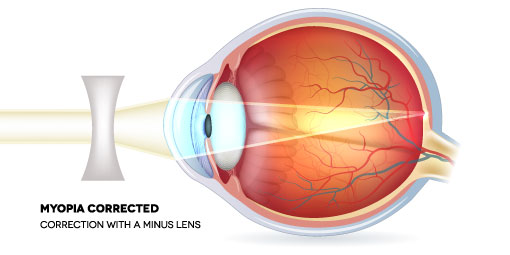
Is There A Cure For Myopia?
Unfortunately, there is currently no known permanent cure for Myopia. However, there are various treatments available that can help manage and correct the condition. These treatments typically involve the use of special myopia control prescription eyeglasses, contact lenses, or refractive surgery. Each treatment option its pros and cons and risk factors (See Best Treatment For Myopia). It is important for individuals with Myopia to regularly visit their eye care provider for updates on their condition and to discuss any changes in their vision. With proper management and care, individuals with Myopia can lead healthy and fulfilling lives.How Can Myopia Be Prevented?
Myopia, also known as nearsightedness, can be prevented or slowed down by practicing good eye habits. Encouraging children to spend time outdoors and limiting screen time can help reduce the risk of developing myopia. Additionally, maintaining a healthy diet rich in nutrients such as vitamin A, C, and E can support overall eye health. Regular eye exams are also important in catching any vision changes early on and addressing them promptly. It is important to follow the recommendations of an eye care professional to help prevent myopia and maintain optimal eye health.Regular eye exams with advanced technologies are essential for the early diagnosis and treatment of Myopia (i.e., nearsightedness). Our Edmonton Eye clinic offers a suite of myopia management services and myopia control products. Schedule an eye exam with an optometrist today!
Schedule An AppointmentFYEyes Blog Posts
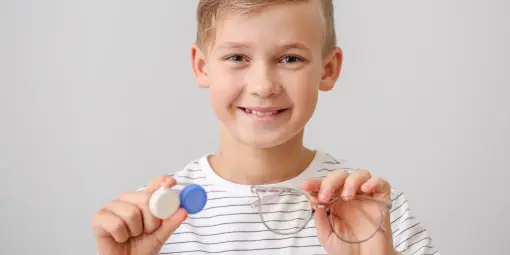
What is the best treatment for myopia?
The best treatment for myopia must factor for risk, result and convenience.
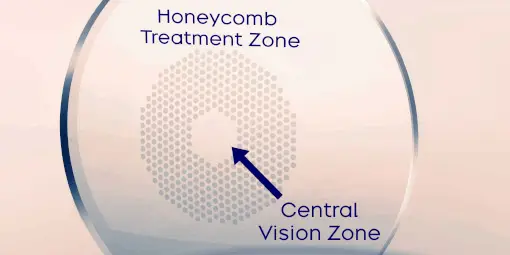
How Much Do Hoya MiYOSMART Lenses Cost? (2026)
The Cost of Hoya MiYOSMART Myopia Control Lenses
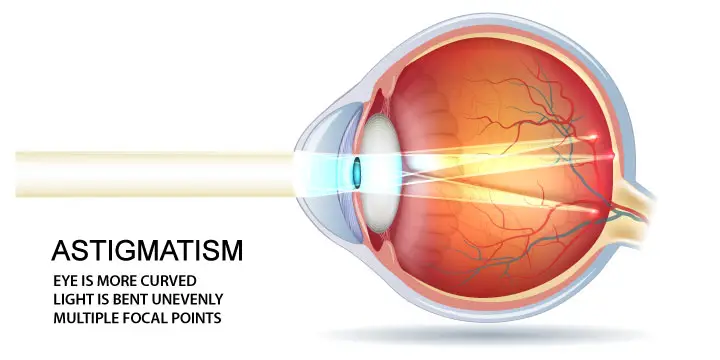
Astigmatism - Symptoms, Causes and Treatment
A refractive error caused by a cornea or lens of the eye that is not perfectly symmetrical.

When Should Kids Get Their First Eye Exam?
Healthy eyes and clear vision are essential for early childhood development. Learn when your child should first visit an optometrist.

Adult Eye Exams
Our advanced eye exams consist of 25+ modern tests and digital scans to assess eye health, function, and visual acuity.

Child Eye Exams
Give your child a clear future with an annual eye exam from our experienced Edmonton optometrists.

Senior Eye Exams
Maintain your vision through your golden years with gold standard eye care from the optometrists at our Edmonton eye clinic.

Contact Lens Eye Exams
Our eye exams for contact lens wearers include test and digital scans to assess eye health, function, visual acuity, and lens fit.

Diabetic Eye Exams
Managing diabetes requires regular eye exams to ensure that diabetes is not causing irreversible vision loss.

Dilated Eye Exams
Dilating the eyes enables our Edmonton optometrists to see more of the eye so that you many never see less.
Our Edmonton Eye Exams Are Comprised Of 4 Phases Of Evaluation

1. Eye Exam Pre-Testing
Corneal Thickness | Intraocular Pressures | Visual Field
Pre-testing is a detailed process that gathers all necessary information for the optometrist in advance of the optometrist-administered eye examination. This process involves completing a detailed patient history, as well as a series of standard tests. Pre-testing is an essential part of the comprehensive eye exam process, providing valuable information and visuals for both the optometrist and the patient.
More About Pre-Testing »
2. Advanced Diagnostic Testing
Retinal Photography, OCT, Topography
eye-deology Vision Care differentiates itself from other clinics by having the most advanced modern diagnostic specialty testing equipment. Specialty equipment, such as a wide-angle high-resolution retinal imager, Optical Coherence Tomography (OCT), Humphrey Visual Field Analyzer and corneal topographer, ensures that patients receive the best comprehensive eye care.
More About Advanced Testing »
3. Optometrist Examination
Health Assessment & Disease Diagnosis
eye-deology Vision Care Edmonton optometrists perform a multitude of tests and assessments to evaluate ocular health, eye coordination, and visual acuity. In addition, they also evaluate the results of the tests and scans performed during pre-testing. As part of patient education, our optometrists also take the time to show and explain results to patients.
More About Doctor Exam »
4. Eye Glass Consult
Prescription | Lens Selection | Digital Fitting
If you require corrective lenses to improve your vision, our licensed opticians will customize their fit to your unique attributes, needs, lifestyle, and budget. Our opticians are happy to provide you with information about the latest eyeglass frame and lens technologies available so you can make informed decisions and begin seeing and looking your best.
More About Eyewear Consult »